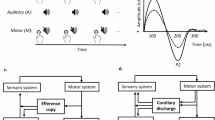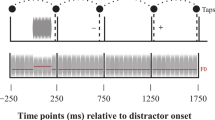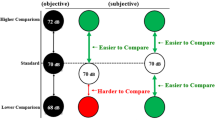Abstract
Understanding how the brain incorporates sensory and motor information will enable better theory building on human perception and behavior. In this study, we aimed to estimate the influence of predictive mechanisms on the magnitude and variability of sensory attenuation in two online samples. After the presentation of a visual cue stimulus, participants (Experiment 1: N = 224, Experiment 2: N = 84) compared the loudness of two consecutive tones in a two-alternative forced-choice task. In Experiment 1, the first tone was either self-initiated or not; in Experiment 2, the second tone was either self-initiated or not (active and passive condition, respectively). We further manipulated identity prediction (i.e., the congruence of pre-learned cue-sound combinations; congruent vs. incongruent), and the duration of the onset delay (to account for effects of attentional differences between the passive and active condition, 50 ms vs. 0 ms). We critically discuss our results within the framework of both classical (i.e., motor-based forward models) and contemporary approaches (i.e., predictive processing framework). Contrary to our preregistered hypothesis, we observed enhanced perceptual processing, instead of attenuation, for self-initiated auditory sensory input. Further, our results reveal an effect of fixed sound delays on the processing of motor and non-motor-based predictive information, and may point to according shifts in attention, leading to a perceptual bias. These results might best be captured by a hybrid explanatory model, combining predictions based on self-initiated motor action with a global predictive mechanism.




Similar content being viewed by others
Data availability
Preregistration, raw data and R scripts are available at PsychArchives (https://doi.org/10.23668/psycharchives.7757).
Notes
Note that tone frequencies slightly differed from the ones stated in the preregistration (300 Hz, 600 Hz).
Decibels relative to full scale (dBFS) is a unit used in digital audio systems that describes the relative loudness of audio signals, with 0 dBFS being the threshold for distortion in the signal (Price, 2007).
Please note that we preregistered the test for an effect of “agency” in the opposite direction (i.e., “active” < “passive”, BF-0).
References
Anton-Erxleben, K., & Carrasco, M. (2013). Attentional enhancement of spatial resolution: Linking behavioural and neurophysiological evidence. Nature Reviews Neuroscience, 14(3), 188–200. https://doi.org/10.1038/nrn3443
Baess, P., Horváth, J., Jacobsen, T., & Schröger, E. (2011). Selective suppression of self-triggered sounds: An EEG study. Psychophysiology, 48, 1276–1283.
Baess, P., Jacobsen, T., & Schröger, E. (2008). Suppression of the auditory N1 event-related potential component with unpredictable self-initiated tones: Evidence for internal forward models with dynamic stimulation. International Journal of Psychophysiology, 70(2), 137–143. https://doi.org/10.1016/j.ijpsycho.2008.06.005
Brown, H., Adams, R. A., Parees, I., Edwards, M., & Friston, K. (2013). Active inference, sensory attenuation and illusions. Cognitive Processing, 14(4), 411–427. https://doi.org/10.1007/s10339-013-0571-3
Cao, L., & Gross, J. (2015). Attention wins over sensory attenuation in a sound detection task. PLoS One, 10, e0136585.
Chennu, S., Noreika, V., Gueorguiev, D., Shtyrov, Y., Bekinschtein, T. A., & Henson, R. (2016). Silent expectations: Dynamic causal Modeling of cortical prediction and attention to sounds that Weren’t. Journal of Neuroscience, 36(32), 8305–8316. https://doi.org/10.1523/jneurosci.1125-16.2016
Dai, H., Scharf, B., & Buus, S. (1991). Effective attenuation of signals in noise under focused attention. The Journal of the Acoustical Society of America, 89(6), 2837–2842. https://doi.org/10.1121/1.400721
Desantis, A., Mamassian, P., Lisi, M., & Waszak, F. (2014). The prediction of visual stimuli influences auditory loudness discrimination. Experimental Brain Research, 232(10), 3317–3324. https://doi.org/10.1007/s00221-014-4001-2
Dogge, M., Custers, R., & Aarts, H. (2019a). Moving forward: On the limits of motor-based forward models. Trends in Cognitive Sciences, 23(9), 743–753. https://doi.org/10.1016/j.tics.2019.06.008
Dogge, M., Hofman, D., Custers, R., & Aarts, H. (2019b). Exploring the role of motor and non-motor predictive mechanisms in sensory attenuation: Perceptual and neurophysiological findings. Neuropsychologia, 124, 216–225. https://doi.org/10.1016/j.neuropsychologia.2018.12.007
Eckert, A.-L., Gounitski, Y., Guggenmos, M., & Sterzer, P. (2022). Cross-Modality Evidence for Reduced Choice History Biases in Psychosis-Prone Individuals. Schizophrenia Bulletin, 2022; sbac168, https://doi.org/10.1093/schbul/sbac168
Friston, K., FitzGerald, T., Rigoli, F., Schwartenbeck, P., O Doherty, J., & Pezzulo, G. (2016). Active inference and learning. Neuroscience & Biobehavioral Reviews, 68, 862–879. https://doi.org/10.1016/j.neubiorev.2016.06.022
Faul, F., Erdfelder, E., Lang, A.-G., & Buchner, A. (2007). G*power 3: A flexible statistical power analysis program for the social, behavioral, and biomedical sciences. Behavior Research Methods, 39, 175–191.
Faul, F., Erdfelder, E., Buchner, A., & Lang, A.-G. (2009). Statistical power analyses using G*power 3.1: Tests for correlation and regression analyses. Behavior Research Methods, 41, 1149–1160.
Ford, J. M., Roach, B. J., Faustman, W. O., & Mathalon, D. H. (2007). Synch before you speak: Auditory hallucinations in schizophrenia. American Journal Psychiatry, 164, 458–466. https://doi.org/10.1176/ajp.2007.164.3.458
Fritz, C., Flick, M., & Zimmermann, E. (2022). Tactile motor attention induces sensory attenuation for sounds. Consciousness and Cognition, 104, 103386. https://doi.org/10.1016/j.concog.2022.103386
Grootswagers, T. (2020). A primer on running human behavioural experiments online. Behavior Research Methods, 52(6), 2283–2286. https://doi.org/10.3758/s13428-020-01395-3
Henninger, F., Shevchenko, Y., Mertens, U. K., Kieslich, P. J., & Hilbig, B. E. (2019). lab.js: A free, open, online study builder [Preprint]. PsyArXiv. https://doi.org/10.31234/osf.io/fqr49
Horváth, J. (2013). Attenuation of auditory ERPs to action-sound coincidences is not explained by voluntary allocation of attention. Psychophysiology, 50(3), 266–273. https://doi.org/10.1111/psyp.12009
Horváth, J., Maess, B., Baess, P., & Tóth, A. (2012). Action–Sound Coincidences Suppress Evoked Responses of the Human Auditory Cortex in EEG and MEG. Journal of Cognitive Neuroscience, 24(9), 1919–1931. https://doi.org/10.1162/jocn_a_00215
Hughes, G., Desantis, A., & Waszak, F. (2013). Mechanisms of intentional binding and sensory attenuation: The role of temporal prediction, temporal control, identity prediction, and motor prediction. Psychological Bulletin, 139(1), 133–151. https://doi.org/10.1037/a0028566
JASP Team (2022). JASP (Version 0.16.3)[Computer software].
Kaiser, J., & Schütz-Bosbach, S. (2018). Sensory attenuation of self-produced signals does not rely on self-specific motor predictions. The European Journal of Neuroscience, 47, 1303–1310. https://doi.org/10.1111/ejn.13931
Kiepe, F., Kraus, N., & Hesselmann, G. (2021). Sensory attenuation in the auditory modality as a window into predictive processing. Frontiers in Human Neuroscience, 15, 704668. https://doi.org/10.3389/fnhum.2021.704668
Klaffehn, A. L., Baess, P., Kunde, W., & Pfister, R. (2019). Sensory attenuation prevails when controlling for temporal predictability of self- and externally generated tones. Neuropsychologia, 132, 107145. https://doi.org/10.1016/j.neuropsychologia.2019.107145
Lange, K. (2009). Brain correlates of early auditory processing are attenuated by expectations for time and pitch. Brain and Cognition, 69(1), 127–137. https://doi.org/10.1016/j.bandc.2008.06.004
Lee, M. D., & Wagenmakers, E.-J. (2013). Bayesian cognitive modeling: A practical course. Cambridge University Press. https://doi.org/10.1017/CBO9781139087759
Lentz, J. (2023). Psychoacoustics: Auditory perception of listeners with normal hearing and hearing loss (2nd ed.). Plural Publishing Inc.
Mifsud, N. G., Oestreich, L. K. L., Jack, B. N., Ford, J. M., Roach, B. J., Mathalon, D. H., & Whitford, T. J. (2016). Self-initiated actions result in suppressed auditory but amplified visual evoked components in healthy participants. Psychophysiology, 53(5), 723–732. https://doi.org/10.1111/psyp.12605
Mifsud, N. G., & Whitford, T. J. (2017). Sensory attenuation of self-initiated sounds maps onto habitual associations between motor action and sound. Neuropsychologia, 103, 38–43. https://doi.org/10.1016/j.neuropsychologia.2017.07.019
Myers, J. C., Mock, J. R., & Golob, E. J. (2020). Sensorimotor integration can enhance auditory perception. Scientific Reports, 10(1), 1496. https://doi.org/10.1038/s41598-020-58447-z
Palmer, C. E., Davare, M., & Kilner, J. M. (2016). Physiological and perceptual sensory attenuation have different underlying neurophysiological correlates. The Journal of neuroscience : the official journal of the Society for Neuroscience, 36(42), 10803–10812. https://doi.org/10.1523/JNEUROSCI.1694-16.2016
Paraskevoudi, N., & SanMiguel, I. (2021). Self-generation and sound intensity interactively modulate perceptual bias, but not perceptual sensitivity. Scientific Reports, 11(1), 17103. https://doi.org/10.1038/s41598-021-96346-z
Price, J. (2007). Understanding dB. Professional Audio. www.jimprice.com.
R Core Team. (2018). R: A language and environment for statistical computing. Https://Www.r- Project.Org/. https://www.gbif.org/tool/81287/r-a-language-and-environment-for-statistical- computing
Reznik, D., Guttman, N., Buaron, B., Zion-Golumbic, E., & Mukamel, R. (2021). Action-locked Neural Responses in Auditory Cortex to Self-generated Sounds. Cerebral Cortex, Volume 31, Issue 12, December 2021, Pages 5560–5569, https://doi.org/10.1093/cercor/bhab179
Reznik, D., Henkin, Y., Levy, O., & Mukamel, R. (2015). Perceived loudness of self-generated sounds is differentially modified by expected sound intensity. PLoS One, 10(5), e0127651. https://doi.org/10.1371/journal.pone.0127651
Reznik, D., & Mukamel, R. (2019). Motor output, neural states and auditory perception. Neuroscience & Biobehavioral Reviews, 96, 116–126. https://doi.org/10.1016/j.neubiorev.2018.10.021
Roussel, C., Hughes, G., & Waszak, F. (2014). Action prediction modulates both neurophysiological and psychophysical indices of sensory attenuation. Frontiers in Human Neuroscience, 8, 115. https://doi.org/10.3389/fnhum.2014.00115
Sato, A. (2008). Action observation modulates auditory perception of the consequence of others’ actions. Consciousness and Cognition., 17, 1219–1227.
Schönbrodt, F. D., Wagenmakers, E.-J., Zehetleitner, M., & Perugini, M. (2017). Sequential hypothesis testing with Bayes factors: Efficiently testing mean differences. Psychological Methods, 22(2), 322–339. https://doi.org/10.1037/met0000061
Schröger, E., Marzecová, A., & SanMiguel, I. (2015). Attention and prediction in human audition: A lesson from cognitive psychophysiology. European Journal of Neuroscience, 41(5), 641–664. https://doi.org/10.1111/ejn.12816
Schwarz, K. A., Pfister, R., Kluge, M., Weller, L., & Kunde, W. (2018). Do we see it or not? Sensory attenuation in the visual domain. Journal of Experimental Psychology. General, 147(3), 418–430. https://doi.org/10.1037/xge0000353
Singmann, H., Bolker, B., Westfall, J., Aust, F., Ben-Shachar, M. S., Højsgaard, S., Fox, J., Lawrence, M. A., Mertens, U., Love, J., Lenth, R., & Christensen, R. H. B. (2022). afex: Analysis of Factorial Experiments (1.1-1). https://CRAN.R-project.org/package=afex
Vogt, A., Hauber, R., Kuhlen, A. K., & Rahman, R. A. (2022). Internet-based language production research with overt articulation: Proof of concept, challenges, and practical advice. Behavior Research Methods, 54(4), 1954–1975. https://doi.org/10.3758/s13428-021-01686-3
Waszak, F., & Herwig, A. (2007). Effect anticipation modulates deviance processing in the brain. Brain Research, 1183, 74–82. https://doi.org/10.1016/j.brainres.2007.08.082
Weiss, C., Herwig, A. & Schütz-Bosbach, S. (2011a). The self in action effects: Selective attenuation of self-generated sounds. Cognition 121, 207–218 (2011a).
Weiss, C., Herwig, A. & Schütz-Bosbach, S. (2011b). The self in social interactions: Sensory attenuation of auditory action effects is stronger in interactions with others. PLoS One 6, e22723.
Wickham, H. (2016). Ggplot2. https://doi.org/10.1007/978-3-319-24277-4
Wickham, H., François, R., Henry, L., Müller, K., Vaughan, D. (2023). dplyr: A Grammar of Data Manipulation. https://dplyr.tidyverse.org, https://github.com/tidyverse/dplyr.
Wiese, W. (2017). Action is enabled by systematic misrepresentations. Erkenntnis, 82(6), 1233–1252.
Wolpe, N., Ingram, J. N., Tsvetanov, K. A., Geerligs, L., Kievit, R. A., Henson, R. N., Wolpert, D. M., Cam-CAN, & Rowe, J. B. (2016). Ageing increases reliance on sensorimotor prediction through structural and functional differences in frontostriatal circuits. Nature Communications, 7(1), 13034. https://doi.org/10.1038/ncomms13034
Woods, K. J. P., Siegel, M. H., Traer, J., & McDermott, J. H. (2017). Headphone screening to facilitate web-based auditory experiments. Attention, Perception, & Psychophysics, 79(7), 2064–2072. https://doi.org/10.3758/s13414-017-1361-2
Zhao, S., Brown, C. A., Holt, L. L., & Dick, F. (2022). Robust and efficient online auditory psychophysics. Trends in hearing, 26, 23312165221118792. https://doi.org/10.1177/23312165221118792
Acknowledgements
The authors would like to thank Stefanie Müller and Lara Raikowski for their invaluable support during this project.
Funding
This work was supported by Leibniz-Institute for Psychology (ZPID) [Grant Number: 7757].
Author information
Authors and Affiliations
Contributions
FK, NK, and GH wrote the manuscript. All authors contributed to the article and approved the submitted version.
Corresponding authors
Ethics declarations
Ethics approval
All procedures performed in studies involving human participants were in accordance with the ethical standards of the local ethics committee at the Psychologische Hochschule Berlin (PHB; approval number PHB29032022) and with the 1964 Helsinki declaration and its later amendments or comparable ethical standards.
Competing interests
The authors declare that they have no known competing financial interests or personal relationships that could have appeared to influence the work reported in this paper.
Additional information
Publisher’s Note
Springer Nature remains neutral with regard to jurisdictional claims in published maps and institutional affiliations.
Supplementary information
ESM 1
(DOCX 910 kb)
Rights and permissions
Springer Nature or its licensor (e.g. a society or other partner) holds exclusive rights to this article under a publishing agreement with the author(s) or other rightsholder(s); author self-archiving of the accepted manuscript version of this article is solely governed by the terms of such publishing agreement and applicable law.
About this article
Cite this article
Kiepe, F., Kraus, N. & Hesselmann, G. Self-initiation enhances perceptual processing of auditory stimuli in an online study. Atten Percept Psychophys 86, 587–601 (2024). https://doi.org/10.3758/s13414-023-02827-w
Accepted:
Published:
Issue Date:
DOI: https://doi.org/10.3758/s13414-023-02827-w




